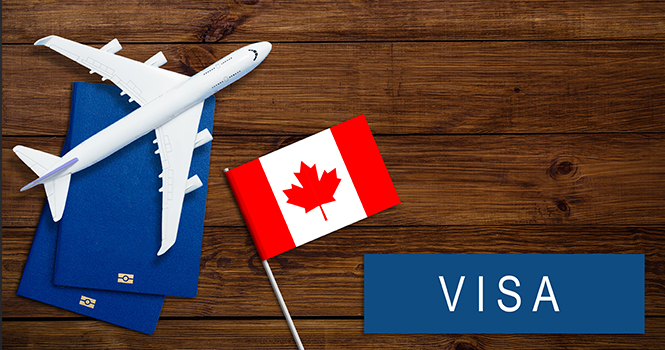
by Immilaw Team | Jan 6, 2024 | Uncategorized
The Canadian government has set ambitious targets for granting PR under the economic category, aiming to welcome 883,635 primary applicants by 2026 according to the new immigration levels plan for 2024-2026. Canada has been facing increased competition for permanent residency among international students due to a surge in applications and a rise in the number of temporary residents within the country. This intensifying competition may pose challenges for international students aspiring to attain permanent residency in Canada.
Canada’s immigration system plans to prioritize international students with High-Demand Skills, aligning permanent residency opportunities with labor market needs. The strategy, part of Global Affairs Canada’s Education Plan, is to better prepare international students for the workforce. The plan expects to strengthen ties between students, post-secondary institutions, and employers, emphasizing work-integrated learning.
Immigration minister Marc Miller recently highlighted plans to revamp the Post-Graduation Work Permit Program, prioritizing support for vital industries experiencing skill shortages. This initiative aims to increase opportunities for international students and work permit holders possessing high-demand skills to extend their stay in the country.
International students holding the Post-Graduation Work Permit (PGWP) and engaged in 82 specific occupations aligned with the Express Entry system stand a better chance at obtaining PR than PGWP holders in different occupations. Experience or employment in these targeted occupations enhances their prospects for securing PR status.
PNPs and Express Entry System
PR can be secured in Canada through two main routes: Provincial Nominee Programs (PNPs) and the Express Entry System. Minister Miller has emphasized efforts to address labour shortages, particularly in vital sectors such as construction and healthcare.
Industries like trade, technology, and healthcare are in high demand across Canadian provinces and within the federal Express Entry system. Proficiency in the French language is also a targeted criterion for Canadian immigration, presenting an additional avenue for PR.
Immigrate To Canada
International students aiming for Canadian PR can focus on these key areas: trades, tech, healthcare, and French proficiency to enhance their prospects within the Canadian immigration landscape.
Pathways for International Students to PR.
Pathways for International Students to PR
Let us look into the easiest pathways for international students to obtain PR in Canada.
1. Pursuing In-Demand Sectors
Consider entering skilled trades, tech, or healthcare sectors during your studies. Skilled trades certification can add 50 extra points in Express Entry, with lower cut-off scores in these specialized draws. All Provincial Nominee Programs (PNPs) in Canada prioritize these sectors in their PR selections.
2. Learning French for PR
This path to PR is less competitive due to the reluctance of most international students to learn French. However, becoming proficient in French makes you eligible for Francophone immigration, offering lower PR points cut-offs in both PNPs and Express Entry.
The 2024–2026 Immigration Levels Plan targets Francophone immigration at 6% in 2024, rising to 7% in 2025 and further to 8% in 2026. Proficiency in both English and French languages presents a significant advantage for international students in this context.
3. Choosing a Second Program
International students completing a 1-year diploma in Canada can pursue a second program after graduation to elevate their Canadian education level. This boosts their CRS points for PR eligibility and extends the PGWP duration.
Opting for a 4-year degree in high-demand sectors such as healthcare allows students to stay legally for the entire program duration, subsequently qualifying for a PGWP of the same duration. This notably enhances their chances of attaining PR, surpassing those students who completed a one-year diploma with a shorter PGWP.\
4. Rural Immigration Programs for International students
International students often overlook rural immigration programs, as many prefer to reside in major cities. Meanwhile, IRCC is exploring avenues to expand the Rural and Northern Immigration Pilot (RNIP) to additional towns and is striving to establish this program as a permanent fixture.
For instance, Alberta offers PR options in over 22 rural communities. Other provinces also provide pathways to PR in rural areas. Students can choose the immigration pathways focused on rural or regional areas an easier route to attain Canadian PR.
5. Exploring Entrepreneurship Opportunities
Exploring the Start-Up Visa program is a great choice for those with innovative ideas or a passion for business. Entrepreneurs who fulfill the criteria of the Canada Start-Up Visa program can apply for PR in Canada. This initiative helps at least five international students attain PR in Canada. While it may seem appealing, the Start-Up Visa Program is not as simple as it seems. Yet, it is a potential option for obtaining Canadian permanent residency and settling for life.
At ImmiLaw Immigration, our seasoned team, consisting of immigration lawyers and overseas study specialists, offers support for study permits, second program selection, post-study pathways, and diverse immigration requirements. Connect with us to pave your path toward a brighter future in Canada.
Feel free to contact us for your queries.
Read To Know: 5 Common Causes For Canada Visitor Visa Rejection

by Immilaw Team | Jan 5, 2024 | Canada Immigration
Canada warmly embraces millions of global students every year. Notably, 2022 was labelled a “record-breaking year” for visa applications by Canadian immigration. Increasingly, students aspire to settle in Canada after their studies, eyeing Permanent Residency (PR) status. Interestingly, for international students, there is a compelling option to keep their PR dream alive: choosing a second Canadian program! This choice opens doors to fresh advantages and opportunities that might otherwise be tough.
Advantages of Enrolling in a Second Program in Canada
Let us explore the advantages of enrolling in a second program in Canada:
1. Extended Post-Graduate Work Permit (PGWP)
Students opting for a second-year program will get a longer post-graduate work permit (PGWP). A single year of study grants only a one-year PGWP. However, committing to 2-3 years of study can secure up to 3 years of PGWP. It is essential to note that they have only one chance to apply for a PGWP. Hence, extending their study plan is a smart move, particularly if they lack adequate prior work experience.
2. Extra CRS Score for PR Application
Canadian qualifications are a big plus to boost your Comprehensive Ranking System (CRS) score. These qualifications are significant in the CRS score, which is crucial for your PR application. Longer study periods increase your CRS score, making it more likely for you to be selected in the express entry pool. Each extra education level you achieve can earn you between 15 to 30 CRS points, making your PR application stronger.
3. Enhances Skillset
Canada’s top-notch education equips students to thrive in its diverse culture. Longer studies upgrade skills, keeping you competitive. Moreover, skill transferability can add a maximum of 100 points to the CRS score. So, extending your studies enhances your skill set, further strengthening your profile.
4. Expanding career options
Studying for 2-3 or more years in Canada offers valuable insights for students, exposing them to diverse career opportunities. This exposure helps students easily change careers or choose their best career path.
How to choose a Second Program?
Selecting a second program for international students in Canada requires strategic planning. You may consider these options:
Targeted Occupations:
Choose a study program that may lead to in-demand occupations and thus enhance your chances of receiving an Invitation to Apply (ITA) under the Express Entry system.
Provincial Nomination Options:
Explore programs in provinces offering nomination pathways for international students. Some provinces offer better immigration programs for international students.
Rural Immigration Programs:
Consider programs in regions supporting Rural Immigration Programs. Some regional programs offer international students unique pathways to permanent residence.
Professional Guidance:
Seek advice from a Canadian immigration lawyer specializing in study-to-migrate programs. Their expertise can ensure that you make informed choices and overcome the complexities of the Canadian immigration landscape efficiently
Conclusion
In conclusion, international students aiming for a second program in Canada should approach their choice strategically since opting for a second program opens the door to numerous opportunities in Canada. A second program in Canada offers longer work permits, boosts CRS scores, enhances skills, and aids in career flexibility. Extending studies strengthens students’ competitiveness. Careful planning and guidance are crucial for making informed decisions, driving them closer to achieving Canadian PR goals.
At ImmiLaw Immigration, our seasoned team, consisting of immigration lawyers and overseas study specialists, offers support for study permits, second program selection, post-study pathways, and diverse immigration requirements. Connect with us to pave your path toward a brighter future in Canada.
Feel free to contact us for your queries.
Book an appoinment

by Immilaw Team | Nov 27, 2023 | Canada Immigration
When applying for a visitor visa, knowing the potential grounds for refusal is essential. Among these reasons, one common cause for rejection is the inability to assure immigration authorities of your intention to depart from Canada after your authorized stay. Having solid proof, such as documents, is crucial to demonstrate your intent to comply with the visa regulations.
The decision of whether to accept or refuse a visa depends on how the immigration officer views your application. If officers suspect you won’t depart Canada after your authorized stay, they might reject your visa. It’s the applicant’s responsibility to prove they meet all visitor visa requirements.
Hence, applicants must show their commitment to returning after their authorized stay by:
- Establishing ties to their residence (like family, social ties, and community involvement).
- Providing evidence of personal assets, employment, and financial status in their home country.
- Clearly stating the purpose of their visit to Canada.
An immigration officer may refuse a visitor’s visa application if they have doubts about the applicant’s intention to depart at the end of the authorized stay.
Free Online Canadian Immigration Assessment
Factors Leading to Visitor Visa Refusals
1. Applicant’s Lack of Ties to Home Country
Insufficient evidence of ties like employment, dependent family, or property at home might lead to concerns about not returning after visiting Canada. Providing employment confirmation, residence proof, and dependent details is crucial.
2. Purpose of Visit Not Clearly Stated
Lack of detailed information about the purpose of the visit might result in visa refusal. Submitting documentation such as invitation letters or event specifics can support the application, especially if the stay is for a specific event.
3. Inadequate Financial Resources
Visa refusals might occur if there’s doubt about the applicant’s ability to finance their return trip or if the sponsor lacks adequate finance to support the visit to Canada.
4. Limited travel history
Previous visa refusals or overstay incidents elsewhere could lead to a rejection. Limited travel history also raises concerns about the likelihood of returning home after the authorized stay in Canada.
5. Misleading Information
Any false or misleading information, whether intentional or not, can lead to visa refusal. It’s essential to fill out forms accurately and provide the necessary documents to avoid misrepresentation issues.
ImmiLaw Immigration is a Canadian licensed immigration law firm with a dedicated team of Immigration lawyers. If you plan to visit your close family and friends in Cannada, we’re here to assist you throughout the process.
Please contact us for any questions or assistance regarding your Canadian r Visa application.

by Immilaw Team | Nov 6, 2023 | Canada Immigration
Nova Scotia, a province in Atlantic Canada, is set to embark on a groundbreaking initiative to bolster its construction industry. The province is launching the Critical Construction Worker Pilot, a pioneering immigration program. The program aims to address the persistent labour shortages affecting 21 essential occupations within the construction sector. This strategic move not only underscores Nova Scotia’s commitment to meeting the industry’s demand but also heralds an innovative approach to resolving employment challenges within the region’s thriving construction landscape.
Free Immigration Assessment
Requirements for the Critical Construction Worker Pilot Program
The Critical Construction Worker Pilot – Job Offer Pathway is exclusively for individuals who have received offers for permanent, full-time employment from a Nova Scotia-based business.
To be eligible, you must:
To be eligible, you must:
- Possess one year of work experience relevant to the job.
- Hold either a high school diploma or evidence of completion of a construction-specific industry training program.
- Age must fall between 21 and 55 years.
- Prove language proficiency equivalent to CLB Level 5 for NOC TEER 0, 1, 2, 3, or CLB Level 4 for NOC TEER 4 and 5, even if English or French is your first language.
- Provide documents proving sufficient financial funds to settle in Nova Scotia.
Immigrate to Canada
In addition to the previously stated requirements, the job offer must also align with the approved National Occupational Classification (NOC) codes outlined below:
- 70010 – Construction managers
- 70011 – Home building and renovation managers.
- 72011– Contractors and supervisors, electrical trades and telecommunications occupations.
- 72014 – Contractors and supervisors, other construction trades, installers, repairers and servicers.
- 72020 – Contractors and supervisors, mechanic trades.
- 72106 – Welders and related machine operators
- 72200 – Electricians (except industrial and power system)
- 72201 – Industrial electricians
- 72310 – Carpenters
- 72320 – Bricklayers
- 72401 – Heavy-duty equipment mechanics
- 72402 – Heating, refrigeration, and air conditioning mechanics
- 72500 – Crane operators
- 73100 – Concrete finishers
- 73102 – Plasterers, drywall installers, finishers and lathers
- 73110 – Roofers and shinglers
- 73200 – Residential and commercial installers and servicers.
- 73400 – Heavy equipment operators
- 75101 – Material handlers
- 75110 – Construction trades helpers and labourers
- 75119 – Other trades helpers and labourers
If you are considering applying for Nova Scotia’s Critical Construction Worker Pilot Program, we encourage you to contact ImmiLaw Immigration today. Our team consists of competent and experienced immigration professionals, including lawyers, licensed paralegals, and consultants, all committed to providing exceptional service. Don’t hesitate—reach out today and let ImmiLaw Immigration’s dedicated team guide you through the process with expertise and care.
Feel free to contact us for your queries.
Read To Know: Nova Scotia to Enhance Immigration Options for Healthcare Professionals

by Immilaw Team | Nov 4, 2023 | Canada Immigration
In a landmark September declaration by Nova Scotia’s Minister of Health, Michelle Thompson, and the province’s Minister of Advanced Education, Brian Wong, Nova Scotia is all set to transform immigration policies for foreign nationals. Immigrating to the province is about to become more accessible with the expansion of Nova Scotia’s “International Graduates in Demand” (IGD) stream within the Provincial Nominee Program (PNP).
Free Immigration Assessment
This strategic move opens the door to prospective international students aspiring to pursue careers as paramedics and pharmacy technicians, making immigration to Nova Scotia an achievable goal for them.
International Graduates in Demand (IGD) stream
Provincial Nominee Programs (PNPs) operate across all Canadian provinces and territories except Quebec and Nunavut. PNPs empower local governments to choose and put forward immigration candidates. These selected candidates are intended for permanent residence (PR) status in their regions. The primary objective of these nominations is to tackle localized labour market shortages and fulfill specific workforce requirements.
Immigrate to Canada
Before this recent expansion, international graduates aspiring to work in the following occupations had the opportunity to immigrate to Nova Scotia through this PNP stream.
As a result of this announcement, the newly added categories include:
- Nurse aides, orderlies, and patient service associates (NOC 2021: 33102)
- Early childhood educators and assistants (NOC 2021: 42202)
- Paramedics (NOC 2021, “Paramedical Occupations”: 32102)
- Pharmacy Technicians (NOC 2021: 32124)
Qualification
To qualify for immigration through this specific stream of Nova Scotia’s Provincial Nominee Program (PNP), interested candidates must fulfill the following criteria:
- Hold a full-time permanent job offer from a Nova Scotia employer in an eligible occupation.
- Fall within the age range of 21 to 55.
- Must have completed a high school education or its equivalent
- Completed a course of study lasting at least 30 weeks within the past three years
- Possess the requisite certifications for the job.
- Have official language proficiency equivalent to a level 5 on the Canadian Language Benchmark (CLB).
- Sufficient financial resources to establish a permanent residence in Nova Scotia.
- Candidates must complete at least 50% of the eligible educational program in Nova Scotia.
How to apply through IGD PNP for Immigration
You may apply for immigration through IGD PNP by three simple steps:
1. Online Application Submission:
Begin by uploading all the necessary documents and submitting a completed application through the government’s official website.
2. Provincial Nomination Approval:
If your application is approved, you’ll receive a provincial nomination certificate.
3. Apply for Permanent Residency (PR):
With your provincial nomination in hand, you may apply for Permanent Residency (PR) directly through Immigration, Refugees, and Citizenship Canada (IRCC). But remember to submit your application within six months of receiving your provincial nomination certificate.
For added flexibility, applicants can request a Letter of Support for a temporary work permit from the Nova Scotia Office of Immigration (NSOI). This allows them to reside in Nova Scotia while their immigration application is being processed.
Demand for Paramedics and Pharmacy Technicians in Nova Scotia
According to the CEO of Nova Scotia’s Pharmacy Association, the province will require approximately 200 more pharmacy technicians in the coming years.
Charbel Daniel, the director of operations for ambulance services provider Emergency Medical Care Inc., mentioned that there may be an opportunity for an extra “150 to 200 paramedic positions” for international students.
In addition to including two occupations in the IGD stream of Nova Scotia’s PNP, there is a substantial demand for individuals seeking employment in various healthcare occupations throughout Canada.
Other In-Demand Healthcare Professions
As of 2023, the top three in-demand healthcare careers in Canada, according to employment agency and consulting firm Randstad, are:
- Registered Nurses (NOC 2021: 31301)
- Personal Support Workers (NOC 2021: 44101)
- Healthcare Aides** (NOC 2021: 33102)
Healthcare Aides can immigrate to Nova Scotia through the IGD stream, as mentioned earlier.
The statistics emphasize the continued demand for healthcare professionals in both Canada and Nova Scotia. As per the Government of Canada, the anticipated number of job openings from 2022 to 2031 is as follows:
- Registered Nurses: 155,400
- Personal Support Workers: 34,500
- Healthcare Aides: 191,000
Category-based Draw for Healthcare professionals
IRCC has launched category-based Express Entry draws, with the initial draw occurring on June 28, 2023. The authorities implemented these draws to attract additional healthcare workers who can actively contribute to Canada’s critical labour market needs.
In 2023, IRCC is actively engaged in conducting category-based draws aimed at issuing Invitations to Apply (ITAs) to eligible candidates. These candidates must possess recent work experience in one of five distinct occupational categories. Notably, one of the categories outlined for 2023 is dedicated exclusively to foreign nationals with recent work experience in healthcare professions. This initiative underscores Canada’s commitment to addressing its healthcare workforce needs through its immigration system.
Two Healthcare Category-Based Draws in 2023
Canada has carried out two healthcare category-based Express Entry draws within the current year.
The initial draw occurred on June 28, extending Invitations to Apply (ITA) to 500 candidates for Canadian Permanent Residency. Candidates with a Comprehensive Ranking System (CRS) score of a minimum of 476 were eligible for this draw.
The second draw in this category took place on July 6, where 1,500 candidates with a minimum CRS score of 463 received invitations.
Nova Scotia is gearing up to broaden the scope of its Provincial Nominee Program (PNP) through the expansion of the “International Graduates in Demand” (IGD) stream. Bringing new horizons to Nova Scotia, this expansion opens doors for healthcare workers to start their promising journey toward Canadian immigration.
Feel free to contact us for your queries.
Read To Know: Business Visitors And Letter Of Invitation For Bringing Them To Canada






